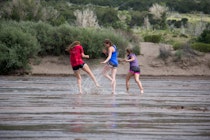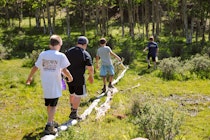Why Camp? Why Now?
Organized camping has been around for more than 150 years.
Charles Eliot, President of Harvard from 1869 to 1909, called summer camps “the most important step in education that America has given the world” and, once remarked “I have a conviction that a few weeks spent in a well organized summer camp may be of more value educationally than a whole year of formal school work”.


In the 21st century it may well be that a camp experience is even more important for today’s youth than it was in Eliot’s time. We know, for instance, that the amount of time the average child spends in the natural world has decreased dramatically over the past few decades. And, at the same time, research tells us that children need a connection with the natural world in important and fundamental ways that we are only beginning to understand.
We also know that the amount of time young people are spending interacting with technological devices has increased significantly. And this means that they are spending less time in human-to-human relationships, which play an important role in providing foundational social skills like collaboration, tolerance, and empathy.
We hear from universities that many college freshmen are arriving without basic emotional strengths—independence, resilience, perseverance, and the ability to make decisions for themselves. Rising rates of childhood depression and anxiety as well as the alarming increase in childhood obesity are at least partially symptomatic of a lack of physical exercise, a shortage of time for free play, and stress-inducing expectations during the school year.
Camp is an antidote to all of these societal issues. Young people thrive in our tech-free community, spend days exploring the natural world with friends and nurturing staff, and have plenty of time to relax and play. They practice social and emotional skills by living with others and by challenging themselves in our adventure-based program. Camp is good for kids!